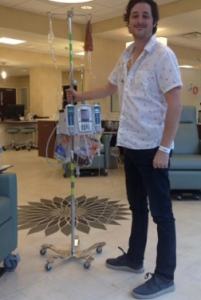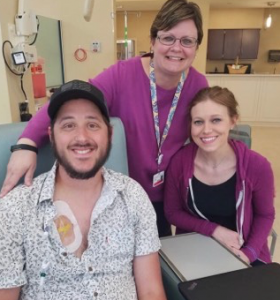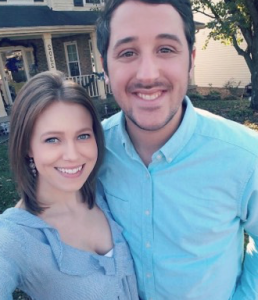By Steve Flairty
Special to NKyTribune
For the regular customers at the Richmond Road Panera Bread, in Lexington, they could tell something wasn’t right with the store manager, Justin Evans. Justin tried to be his usual jovial and upbeat self, but it was a struggle, especially to do so for a nine-hour shift.
Truth be told, it just might have had something to do with the chemo treatments he was undergoing for cancer, a condition specifically known as stage 3 Nodular sclerosing Hodgkins lymphoma.

Justin at the treatment center. (Photos provided)
Today, the 30-year-old is back to being his old self again — now managing the Panera Bread store across town at Palomar Centre. And for that, he has quite a story to tell; it’s a story of a positive attitude through hardship, plus old-fashioned loving support from a network of people that includes relatives, friends, and those giving medical care.
He is a “poster boy” of success for the Baptist Health system: Baptist Health – “WITH BAPTIST, I DIDN’T HAVE TO CHOOSE… most importantly, Justin is an example of hope in the never-ending fight against the cancer scourge that is always with us.
His journey started back in 2016. While at work, he felt some serious pains in his side. “I thought my appendix was going to rupture,” Justin recalled. “I didn’t think I could drive, so I called my wife and went to the ER. They did a CAT scan, and they found swollen lymph nodes around the stomach, but that it was probably something in the gastrointestinal tract and sent me home with pain pills.”
But after looking at the scan, Baptist Health called him to come in for a checkup about an unfriendly lump they saw. He was diagnosed with the afore-mentioned cancer and assigned Dr. Lee Hicks as his attending physician, who, along with others involved with his care, would come to garner high praise from Justin.
Through the proper chemo treatment, the condition could be handled with success, and that soothed Justin.
“We’re going to melt it like butter; it’s a proven treatment,” said Dr. Hicks.
But it wouldn’t be easy.

Justin with his social worker Angie, and wife, Katie
The process would first require putting a “port” in his chest. That would be somewhat invasive, but would facilitate the treatment routine—and cut down on the need for frequent needle pricks, certainly dreadful for many. Justin, by all accounts, was compliant with what the medical staff requested. “When I started treatment, it was ‘Tell me what I’ve got to do and I’ll do it.”
And he did. He respected the staff and they respected, and enjoyed, Justin and his engaging personality…a guy who would bring cookies to hand out at the sessions and always with a ready joke to crack.
The medical advice given was that preferably, he’d not continue his work schedule during the period of treatments, mainly because his immune system would be down. Justin, not one to sit still, decided to keep working; Panera was supportive, but with some prudent guidelines. “They didn’t want me in the café by myself,” Justin said, “and another manager would have to be there so that I could leave instantly (if ill).”
Treatment time and work time became a ritual. “I would do chemo and the next day I’d have the day off,” he continued. “The second day after chemo, I’d do paperwork at home. Then I’d work eight to five the other four days. Panera was a big part of my recovery. It was my coping mechanism. . .coming to work and talking with people.”
Treatment time also brought on the side effect of “chemo brain,” when his memory became diminished. “I started caring a ‘little black book’ around,” he noted, “and it lasted a year after treatment.” Nausea often was a problem until he “got a hold of it with diet,” and he explained it as being like “the worst hangover of your life.” Fatigue, made worse by being on his feet for nine hours at work, caused him to “come home, pound a bunch of food, and go to sleep.” He also mentioned doing yoga and using essential oils as useful through the treatment period, running from December 2016 through May of 2017.
Now two years later, Justin Evans is back to being one of those guys who “fills up the room” as you see him on duty at the Palomar Panera. He’s full of energy, yet he patiently listens to the needs of customers on the floor and other staff members. “I’m not in the food industry; I’m in the people industry,” he likes to say. He laughs and is playful, and he keeps the operation moving. . .something he’s helped do since he started as a Panera employee as a 16-year-old.

Justin and wife, Katie
Justin is the product of good and collaborative care during his illness, and he acts like a person filled with gratitude—because he is. He continually praises his caregiving wife, Katie, who he met at Panera and is also his partner in hobbies such as hiking, kayaking, and cooking.
Dr. Lee Hicks, his main cancer physician, was one he admired greatly, who “plays the piano and writes songs for patients,” noted Justin. Angie Pennington, the Baptist Health social worker, was an amazing encourager who also was a baby-sitter years ago for Justin (“I was bad…really bad as a kid,” he said with a grin.) She also pointed him in the direction of joining an informal network of former patients who help new patients navigate the challenges of cancer and treatment. Kelly Tipton, the nurse with whom he worked most closely, was highly competent and kind. Justin’s mother is also a social worker; she helped by researching the type of cancer confronting him.
And then there were his friends…texting, visiting, and often showing up in his driveway with food. Justin considers himself a blessed man…saying that, ironically, his supporters might have had it worse. “My job was to go get treatment, get sick, and go to work. Their job was a lot harder.”
It would also be hard to spend time with Justin Evans and not go away with a hopeful feeling. Here are some of the affirmations and wise thoughts I heard from him in a recent interview, lasting slightly over an hour:
“I need to give back. I’m full.”
“I don’t sweat the small stuff anymore…even to a fault.”
“If you want something, you’ve got to get it.”
“Every cancer patient’s journey is different.”
He calls his two dachshunds and a “mutt ” his “therapy dogs.”
“Being uncomfortable in situations is how you grow.”
“Heroes show up in the most unlikely places.”
“We all need to feel connected to others.”
Perhaps the most valuable thing we might learn from Justin is to simply, and responsibly, embrace each moment in life. That’s whether we’re dealing with a rude interlude into an otherwise happy existence, or experiencing the joys of kind acts.
Justin Evans does that on a perennial 24-hour shift.

Steve Flairty is a teacher, public speaker and an author of six books: a biography of Kentucky Afield host Tim Farmer and five in the Kentucky’s Everyday Heroes series, including a kids’ version. Steve’s “Kentucky’s Everyday Heroes #4,” was released in 2015. Steve is a senior correspondent for Kentucky Monthly, a weekly KyForward and NKyTribune columnist and a member of the Kentucky Humanities Council Speakers Bureau. Contact him at sflairty2001@yahoo.com or visit his Facebook page, “Kentucky in Common: Word Sketches in Tribute.” (Steve’s photo by Connie McDonald)
























